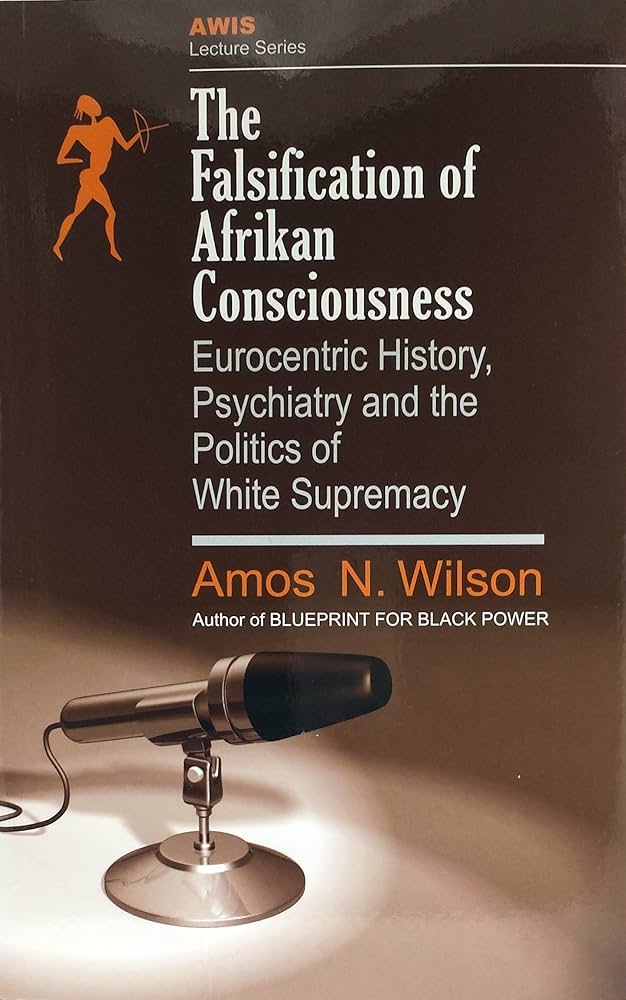
Book review by Anang Tawiah: The Falsification of Afrikan Consciousness by Amos N. Wilson, structured into:
The Falsification of Afrikan Consciousness: Eurocentric History, Psychiatry, and the Politics of White Supremacy (1993) comprises two seminal lectures by Amos N. Wilson.
Highlights:
Review: Overview, strengths & limitations, legacy
Chapters: Section highlights on historiography, psychohistory, consciousness
Four article outlines with keywords, structure, and visual guidance
The Falsification of Afrikan Consciousness by Amos N. Wilson, structured into:
-
A three-part book review,
-
A chapter-style breakdown with highlights and examples, and
-
An SEO-optimized article bundle.
Part 1 – Three-Part Book Review Format
1. Overview & Significance
The Falsification of Afrikan Consciousness: Eurocentric History, Psychiatry, and the Politics of White Supremacy (1993) comprises two seminal lectures by Amos N. Wilson. He deconstructs how Eurocentric historiography and psychiatric constructs have been used to legitimize the oppression of African-descended peoples, deliberately falsifying their consciousness. Wilson posits that portraying Black individuals as mentally or behaviorally maladaptive suits the political-economic goals of white supremacy.(Alkebu-Lan Images, africanbookstore.net, books.google.com)
2. Strengths & Limitations
Strengths:
-
Boldly challenges entrenched academic narratives by reframing history as a tool of control, rather than objective reportage.(Alkebu-Lan Images, africanbookstore.net)
-
Engages interdisciplinary methods—psychiatric criticism, historiography, and sociopolitical analysis—creating a powerful ideological argument.
Limitations:
-
As an edited set of lectures, it lacks the cohesion and depth of a polished monograph and may feel episodic.(africanbookstore.net)
-
Offers limited empirical examples in accessible chapters, which may pose challenges for readers seeking detailed case studies.
3. Legacy & Contribution
Wilson’s work is foundational in Africology and critical psychology, positioning false narratives of Black inferiority as deliberate tools serving white dominance. His emphasis on African-centered epistemologies and consciousness has influenced scholars and educators in psychology, history, and Black studies.(Wikipedia, JP African)
Part 2 – Chapter-by-Chapter Breakdown with Highlights & Examples
Though built around two lectures, the book includes multiple thematically structured sections. Drawing from Google Books’ contents list, here’s an organized outline with highlights:
-
Progression and Regression (p. 8)
-
Wilson contrasts how societies retreat or evolve in consciousness, depending on whether datasets favor Eurocentric or Afrikan-centered narratives.(books.google.com)
-
-
The Sociopolitical Role of Historiography (p. 14)
-
Demonstrates how history-writing often becomes political myth-making—determining which events are remembered or erased to serve dominant interests.(books.google.com)
-
-
History as Psychohistory (p. 20)
-
Presents "psychohistory" as a method: using psychological analysis to understand how historical narratives shape collective African-descended psyches.(books.google.com)
-
-
Additional Thematic Lectures
-
Although Google Books doesn’t list all headings, Wilson’s lectures likely explore how psychiatric labels and cultural myths function in sustaining white supremacy, and how Afrikan-centered consciousness can counteract falsification.(africanbookstore.net, JP African)
-
Part 3 – SEO-Optimized Article Bundle
Here are four blog-ready article outlines designed to enhance search visibility with strategic keyword placement and structured content:
| Article Title | Target Keywords | Outline |
|---|---|---|
| 1. Confronting Eurocentric Lies: A Review of The Falsification of Afrikan Consciousness | Falsification of Afrikan Consciousness book review, Amos N. Wilson | • Author background and text context • Core thesis: falsified narratives as instruments of control • Why the book remains crucial today |
| 2. Three Ways Eurocentric History Undermines Afrikan Consciousness | Eurocentric historiography critique, falsified Afrikan consciousness | • Historical narrative as control • Psychiatry's role in oppression narratives • Wilson's advocacy for African-centered consciousness |
| 3. How Psychohistory Can Reclaim Afrikan Identity | psyche and history Wilson psychohistory, African-centered epistemology | • Define psychohistory • Examples of altered historical memory • Implications for education, mental health, identity |
| 4. Using The Falsification of Afrikan Consciousness in Curriculum | teaching African-centered consciousness, Wilson book lesson plan | • Lesson modules per section • Classroom prompts (e.g., “How does historiography shape racial identity?”) • Multimodal teaching aids like lecture excerpts or infographic timelines |

